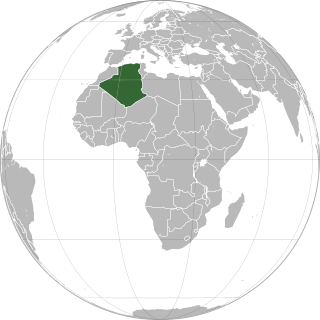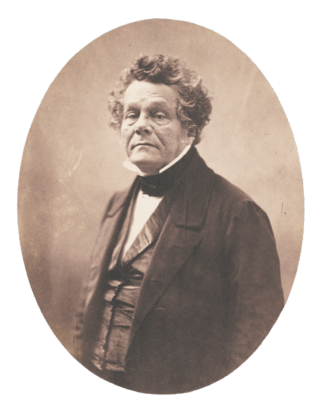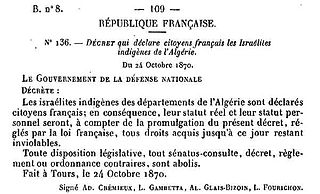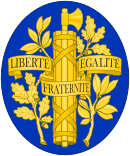
Marie Joseph Louis Adolphe Thiers was a French statesman and historian. He was the second elected President of France and first President of the French Third Republic.

Léon Gambetta was a French lawyer and republican politician who proclaimed the French Third Republic in 1870 and played a prominent role in its early government.

French Algeria, also known as Colonial Algeria, was the period of Algerian history when the region was a colony and later a part of France. French rule in the region began after the French successful invasion of Algeria and lasted until the end of the Algerian War leading to its independence in 1962. After being a French colony from 1830 to 1848, Algeria was a part of France from 4 November 1848 when the Constitution of French Second Republic took effect until its independence on 5 July 1962.

The History of the Jews in Algeria refers to the history of the Jewish community of Algeria, which dates to the 1st century CE.

Isaac-Jacob Adolphe Crémieux was a French lawyer and politician who served as Minister of Justice under the Second Republic (1848) and Government of National Defense (1870–1871). Raised Jewish, he served as president of the Alliance Israélite Universelle, secured French citizenship for Algerian Jews under French rule through the Crémieux Decree (1870), and was a staunch defender of the rights of the Jews of France.

The Government of National Defense was the first government of the Third Republic of France from 4 September 1870 to 13 February 1871 during the Franco-Prussian War. It was formed after the proclamation of the Republic in Paris on 4 September, which in turn followed the surrender and capture of Emperor Napoleon III by the Prussians at the Battle of Sedan. The government, headed by General Louis Jules Trochu, was under Prussian siege in Paris. Breakouts were attempted twice, but met with disaster and rising dissatisfaction of the public. In late January the government, having further enraged the population of Paris by crushing a revolutionary uprising, surrendered to the Prussians. Two weeks later, it was replaced by the new government of Adolphe Thiers, which soon passed a variety of financial laws in an attempt to pay reparations and thus oblige the Prussians to leave France, leading to the outbreak of revolutions in French cities, and the ultimate creation of the Paris Commune.

Abderrahmane Farès was the Chairman of the Provisional Executive of Algeria from 13 April 1962 to 20 September 1962.

The Second Legislature of Quebec was the provincial legislature of Quebec, Canada from 1871 to 1875, following the general election of 1871.

The Crémieux Decree was a law that granted French citizenship to the majority of the Jewish population in French Algeria, signed by the Government of National Defense on 24 October 1870 during the Franco-Prussian War. It was named after French-Jewish lawyer and Minister of Justice Adolphe Crémieux.
The Republican Union, later known as the Progressive Union, was a French parliamentary group founded in 1871 as a heterogeneous alliance of moderate radicals, former Communards and opponents of the French-Prussian Treaty.
The Union for Social Progress was a list that contested the Algiers Muslim non-citizen constituency in the 1945 French Constituent Assembly election. The list was close to the French Section of the Workers International. The candidates of the list were Bachir Abdelouahab, Mohand Achour, Abderrahmanne Bouthiba and Abderrahmane Farès.

Elections to the National Assembly of France were held in Algeria on 17 June 1951. Algeria had 30 of the 625 at the National Assembly.

Elections to the National Assembly of France were held in Algeria on 20 February 1876 as part of the wider National Assembly elections. At that time, Algeria had three representatives in the National Assembly.
The following is a timeline of the history of the city of Oran, Algeria.

Pierre Paul Devès was a French politician. He was a deputy from 1876 to 1884, and senator from 1886 until his death in 1899. He was Minister of Agriculture from 1881 to 1882, and Minister of Justice from 1882 to 1883.

François Henri René Allain-Targé was a French politician of the French Third Republic. He served as Minister of finance under Léon Gambetta and Minister of the interior under Henri Brisson.

A senator for life was an honorary position in the French Third Republic, similar to that of senator for life in other countries. At one time the French Senate was composed of 300 members, of whom 75 were inamovible ("unremovable").

Auguste Hubert Warnier was a French medical doctor, journalist and politician who spent most of his career in Algeria. At first he was a Saint-Simonian and was sympathetic to the local population. He thought the Berbers had Germanic blood and a civilization derived from Roman and Christian origins, so could readily adapt to French civilization. He had no respect for the Arab "intruders". Later he took the view that the indigenous people had destroyed the once-fertile environment of Algeria, became a proponent of French colonization and opposed the "Arab Kingdom" policy of Napoleon III. In his last years he was a Representative in the National Assembly for the Province of Algiers. He was responsible for a law that allowed expropriation of land or forced sale to colonists.
Ferdinand Lelièvre was a French lawyer and colonial landowner who became Senator of the Algiers department of Algeria from 1876 to 1885. He was an active supporter of the French Second Republic of 1848–51, and an opponent of the Second French Empire that followed. This led to his deportation to Algeria in 1858, where he became influential in opposition politics. After the fall of the empire, he was elected Senator of Algeria on a Republican platform.

Rémy Jacques was a French lawyer and politician. He represented the department of Oran, French Algeria, in the National Assembly and then the Chamber of Deputies from 1871 to 1882. He was then Senator of Oran from 1882 to 1900.
















